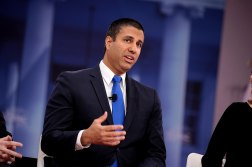Federal data-sharing may spot students eligible for internet subsidy

The federal infrastructure bill passed late Friday would require the U.S. Department of Education to share which low-income students are eligible for a $30 internet subsidy.
If the bill is signed by President Joe Biden, the agency will be required to set up a data-sharing agreement with the Universal Service Administrative Company, a nonprofit that administers the federal Emergency Broadband Benefit program. That would streamline the application process for students who receive federal Pell Grants, who previously needed to pull information from other government websites to prove their eligibility. Data sharing would allow for eligibility to be checked automatically, said Emily Bouck West, deputy executive director of Higher Learning Advocates, a Washington D.C. nonprofit.
“Relying on them to be responsible for accessing the internet in order to upload their verification is really just another big barrier to entry for students,” Bouck West said. “Hopefully, the new process of requiring some data matching between federal agencies will lower that barrier.”
The broadband subsidy program launched during the coronavirus pandemic to help people afford internet as more services moved online and schools moved to remote learning. The Federal Communications Commission needed to get the program online quickly after a federal relief bill created it in December 2020, Bouck West said, so there wasn’t time to set up automatic eligibility verification.
The Department of Education emailed the millions of students who received Pell Grants to let them know they were eligible, she said, and students could use that email or screenshots of student aid online dashboards as proof of their eligibility. Of more than 6 million EBB applicants, about 216,000 selected Pell Grant status as an eligibility marker, while Medicaid and nutrition assistance programs were the most common selections.
The infrastructure bill would require the secretaries of Education, Agriculture and Health and Human Services to enter agreements with USAC to share data through a centralized application system called the National Verifier. The bill sets a timeline of 60 days to enter a memorandum of understanding and 90 days to start sharing data.
“Hopefully that increases the enrollment and usage in the program and hopefully ultimately more students are completing their degrees and credentials,” Bouck West said.
The data-sharing requirement is just one part of the $14.2 billion provision in the Infrastructure Investment and Jobs Act that establishes extension, expansion and oversight for the Emergency Broadband Benefit Program, now renamed the Affordable Connectivity Program. The bill also designates $65 billion for broadband.




